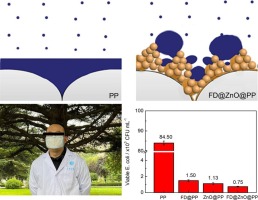Abstract
Face masks are widely used for protecting against the COVID-19 pandemic and other diseases. However, the lack of virucidal properties in conventional face masks increases the risk of cross-infection and potential contamination. Here, we report preparation of a superhydrophobic and anti-bacterial polypropylene fabric by in turn incorporation of ZnO nanoparticles and perfluorodecyl polysiloxane modified SiO2 nanoparticles. The fabric exhibits high superhydrophobicity with a water shedding angle of similar to 6 degrees and excellent moisture resistance, which enable maintenance of functionality effectiveness of the face masks in cold weather conditions. When utilized as a middle layer in face masks, the fabric demonstrates remarkable anti-bacterial activity against E. coli in both laboratory and outdoor environments. This anti-bacterial performance is attributed to the synergistic effect of superhydrophobicity and the ZnO nanoparticles. The excellent superhydrophobicity significantly reduces adhesion of E. coli on the fabric. Meanwhile, the embedded ZnO nanoparticles can eliminate the small number of adhered bacteria through their inherent anti-bacterial property. The combination of superhydrophobicity and anti-bacterial property in the fabric presents a promising solution for enhancing the performance of face masks. The superhydrophobic anti-bacterial fabric holds great potential for various practical applications in the field of personal protective equipment, healthcare, and disease prevention.

Keywords Plus:SELF-STERILIZATION,NANOPARTICLES
Published in SURFACE & COATINGS TECHNOLOGY,Volume476,10.1016/j.surfcoat.2023.130229;JAN 30 2024


